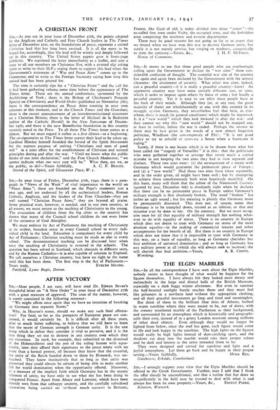Sta,—It seems to me that those good people who are
everlastingly calling upon the Government to declare its " war aims " show con- siderable confusion of thought. The essential war aim of the country has again and again been declared by the Government with the utmost clearness: the attainment of security. What other war aims, indeed, can a peaceful country—if it is really a peaceful country—have? An aggressive country may have some entirely different aim, or aims, which it seeks to impose upon others by force of arms ; but hardly a peaceful country. Yet it is easy to see what these people have at the back of their minds. Although they (or, at any rate, the great majority of them) are wholeheartedly at one with this country in its struggle against Germany, they nevertheless feel that here, as else- where, there is much (in general conditions) which might be improved. It is a " new world " which they look forward to after the war: and they cannot see why this " new world " should not be mapped out, at least in outline, before the war is ended. Perhaps the answer to them may be best given in the words of a now almost forgotten politician, Windham (the contemporary of Pitt): " It is not good policy to try to rebuild or renovate a house when a hurricane is raging."
Surely, if there is one lesson which is to be drawn from what has been called the " tragedy of Versailles " it is this: that the politicians who were gathered together to arrange that treaty made a capital mistake in not keeping the two aims they had in view separate and distinct. Those two aims were : (t) the arrangement of a treaty with Germany which would guarantee the permanent peace of Europe ; and (2) a " new world." Had those two aims been taken separately, and in the order given, all might have been well ; but by attempting to achieve them simultaneously both were hopelessly muddled. On this basis, many will think that the editor of the Nineteenth Century (quoted by you, December 6th) is absolutely right when he declares that there can be no permanent peace in Europe unless Germany's military strength is first absolutely broken. The word " broken " has rather an ugly sound ; but his meaning is plainly that Germany must be permanently disarmed. This does not, of course, mean that Germany is to be trampled down, treated as an inferior, or that any injustice may be done to her. On the contrary. But we must recog- nise once for all that equality of military strength has nothing what- ever to do with equality of status. There is no country in Europe which does not desire to treat with Germany on terms of the most absolute equality—in the making of commercial treaties and other arrangements for the benefit of all. But there is no country in Europe which does not know that it is impossible to treat with Germany in this way, on a basis of equality, so long as Germany cherishes her foul ambition of universal domination ; and so long as Germany has any military power at all (which she will always seek to increase) she


























 Previous page
Previous page